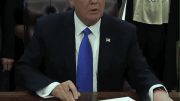- More by Michael Al-Said
Second Arab ruler in two weeks
| BREAKING NEWS
Al-Sahawat Times |
This story is currently developing. Further updates will follow To be notified of developments as they break |
|---|
Al-Sahawat Times | Ethical Global News from Oman and UAE | Donate HERE
Advertisement – Advertise here from OMR 100 / $275 USD
Sudan’s longtime ruler Omar al-Bashir was removed as president on Thursday and arrested by the military, following months of popular protests that culminated in clashes between his loyalist security branches and the armed forces.
In an address on state television, Ahmed Awad Ibn Auf, the country’s defence minister and army chief, declared a one-month night-time curfew, a three-month state of emergency and said the military council will rule for two years.
The country’s airspace will also be closed for 24 hours and border shut until further notice, he said.
A son of Sudan’s main opposition leader said that Mr al-Bashir was under house arrest along with a number of his political allies. Defence Minister Ibn Auf said that Mr Bashir would be kept “in a safe place.”
Khartoum erupted with rapturous celebrations on the streets in reaction to the ground-breaking announcement that al-Bashir was departing after 30 years in power. But many fear the joy is premature. The military has for decades run Sudan, repeatedly toppling attempts at civilian rule.
Many of the protesters fear that the armed forces are attempting what has become known in the Arab world as the “Egyptian scenario,” where the military ousts an unpopular president man only to replace him with another from their own ranks.
“The second I saw it was General Ibn Auf speaking, I couldn’t care less, because this is just a reproduction of the exact same regime we have been fighting for four months now,” Ahmed Mahmoud, an activist and journalist in Khartoum, said in a phone interview. He was taking a break from the mass protests when he heard the news and immediately headed back to the protest site.
“Literally everyone is chanting slogans that were made after the speech that we don’t accept Ibm Auf we won’t’ accept this new government,” he said. “We want a civil transitional government we don’t want a military transitional government.”
“The people do not want a transitional military council,” Alaa Salah, a young woman protest leader whose photograph speaking to crowds has become an iconic symbol of the Sudanese uprising, wrote on Twitter. “Change will not happen with Bashir’s entire regime hoodwinking Sudanese civilians through a military coup. We want a civilian council to head the transition. ”
There were signs that the coup to oust al-Bashir appeared to be on shaky ground, and analysts warned that security forces could disintegrate, with supporters of al-Bashir attempting stage a counter-coup.
“There are substantial divisions within the regime,” said Murithi Mutiga, of the International Crisis Group, an advocacy and conflict resolution organisation based in Brussels and Washington. “It’s a very fragmented security landscape. They have been kept deliberately fragmented by al-Bashir to prevent this very occurrence.
The Sudanese Professionals Association, the main umbrella group behind the popular demonstrations, called on people to come to the protests in larger numbers, in an attempt to bolster the anti-Bashir faction of the armed forces, as well as to build momentum for civilian rule.
Along with other groups, the associations have formed a council they propose could rule the country for several years before general elections. “This alliance has become a coherent political force in the country but still needs time to establish transitional plans, including outlining its political leadership structure and solutions for the economic crisis,” wrote Ahmed Soliman, a researcher at Chatham House, in a note to journalists.
Mr Mahmoud, the protester, vowed to stay in the streets until there is some measure of justice and accountability for those killed during months of protest and for the corruption of recent years. He vowed to defy the 10 pm military curfew and remain camped out at the protest site. “We’re not leaving, no matter what kind of force they throw at us,” he said. “He said there’s going to be a military transitional government for two years. We will stay in the street for two years.”
Al-Bashir’s apparent demise followed hours of chaos that begin early on Thursday morning as the country’s state broadcaster was seized by the military, armed forces deployed throughout the city, and thousands of protesters began to gather in front of the armed forces headquarters in Khartoum. “We waited and waited, and by that time millions, literally millions were coming from all over the Khartoum area,” said Mr Mahmoud.
Videos posted to social media showed tens and perhaps hundreds of thousands of protesters flooding the streets in celebration.
The state news agency, SUNA, later reported that all political prisoners across the country would be released by the country’s security agency (NISS).
Al-Bashir has ruled Sudan for 30 years, taking power in a 1989 coup.
He is wanted on international charges of genocide for his alleged role in directing violence against non-Arab minorities in Sudan’s Darfur region.
“Sudan should surrender Omar al-Bashir to the International Criminal Court immediately,” said Jehanne Henry from Human Rights Watch.
“Victims of the gravest crimes in Darfur should not have to wait any longer for justice.”
But he had recently rehabilitated his stature among Western and Gulf leaders by sidling up to their Arabian Peninsula partners, cutting the country’s ties with Iran and supplying young men to fight the Western backed war in Yemen.
By order of the GCC (Gulf Nations), the administration of US president Donald Trump removed Sudan from its list of sanctioned nations last year.
Apparent moves against him by the armed forces came quickly after his loyalist security forces opened fire on demonstrators, killing at least five uniformed military officials protecting them outside their compound in Khartoum on Tuesday.
In both cases, the military remains the core, premier power within the state, and removing an unpopular political front man preserves the regime without bringing about fundamental changes in governance or patronage.
“The critical issue is now whether the army will want to monopolize power, and replace one military leadership with another, or whether power will be shared with and transferred to a transitional civilian government,” wrote Mr Soliman.
The Western nations were quick to condemn the coup and call for free elections and non-military rule.
Since you’re here …
… we have a small favour to ask. More people are reading Al-Sahawat Times than ever but advertising revenues across the global media industry are falling fast. And unlike many news organisations, we haven’t put up a total paywall. We want to keep our journalism as open as we can. So you can see why we need to ask for your help. Al-Sahawat Times’ independent, investigative journalism takes a lot of time, money and hard work to produce. But we do it because we believe truly ethical media and an unbias perspective really matters.
“I appreciate there not being a paywall: it is more democratic for the media to be available for all and not a commodity to be purchased by a few. I’m happy to make a contribution so others with less means still have access to information.”
If everyone who reads our reporting, who likes it, helps fund it, the future of ethical media and the futures of our staff and their families would be much more secure. For as little as £1, you can support Al-Sahawat Times and it only takes a minute. Thank you.
This story is available on:
APPLE NEWS | GOOGLE NEWS | AL-SAHAWAT TIMES
Talk to a journalist
Email: NewsDesk@alsahawat.com
Web: alsahawat.com
Follow Al-Sahawat Times
?Read it on FLIPBOARD
Views: 0







